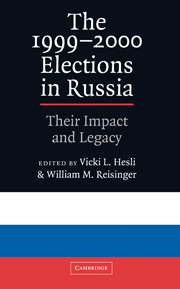Book contents
- Frontmatter
- Contents
- Contributors
- Acknowledgment
- SECTION I INTRODUCTION
- SECTION II PARTIES IN THE ELECTORATE
- SECTION III THE ROLE OF REGIONAL POWER
- SECTION IV PARTIES AND INSTITUTIONS
- 8 Instrumental Democracy: The End of Ideology and the Decline of Russian Political Parties
- 9 The Impact of the 1999–2000 Parliamentary and Presidential Elections on Political Party Development
- 10 Resolving the Problem of Preelection Coordination: The 1999 Parliamentary Election as an Elite Presidential “Primary”
- 11 Coalition Politics in the New Duma
- SECTION V CONCLUSION
- Bibliography
- Index
10 - Resolving the Problem of Preelection Coordination: The 1999 Parliamentary Election as an Elite Presidential “Primary”
Published online by Cambridge University Press: 23 October 2009
- Frontmatter
- Contents
- Contributors
- Acknowledgment
- SECTION I INTRODUCTION
- SECTION II PARTIES IN THE ELECTORATE
- SECTION III THE ROLE OF REGIONAL POWER
- SECTION IV PARTIES AND INSTITUTIONS
- 8 Instrumental Democracy: The End of Ideology and the Decline of Russian Political Parties
- 9 The Impact of the 1999–2000 Parliamentary and Presidential Elections on Political Party Development
- 10 Resolving the Problem of Preelection Coordination: The 1999 Parliamentary Election as an Elite Presidential “Primary”
- 11 Coalition Politics in the New Duma
- SECTION V CONCLUSION
- Bibliography
- Index
Summary
The following seemingly shocking commentary appeared four weeks after the 1999 election to the Russian parliament, the State Duma, in one of the country's leading elite periodicals. Yet, what it was saying by then had become the conventional wisdom and could hardly surprise any readers. The newspaper recounted the story of one of the main contestants of the 1999 election the following way:
As recently as three months ago, no one had any doubts that OVR [Fatherland-All Russia] would receive a majority in the State Duma. But now, even though that alliance has managed to get into the Duma, the doubts about its ability to form an independent faction there are well justified.
(Sanko 2000, 3)The fate of Fatherland-All Russia (OVR) which was, indeed, an unquestionable front-runner as late as three months prior to the election is but one example of the sharp turns that the fortunes of parties and political personalities are known to take in Russia. With more than ten years of experience in electoral politics, however, should we not expect more predictability and continuity in the political system? Or is there a good explanation for the persistent alterations of the political landscape and the unpredictable party realignments?
The answer to the puzzle lies in adjusting our perception of the objectives of the players behind parties. I suggest that the conduct of the parliamentary campaign and the process of elite endorsement of the major contestants were driven by a complex mix of goals in which subsequent access to the presidency was a weighty component.
- Type
- Chapter
- Information
- The 1999–2000 Elections in RussiaTheir Impact and Legacy, pp. 213 - 231Publisher: Cambridge University PressPrint publication year: 2003
- 8
- Cited by



